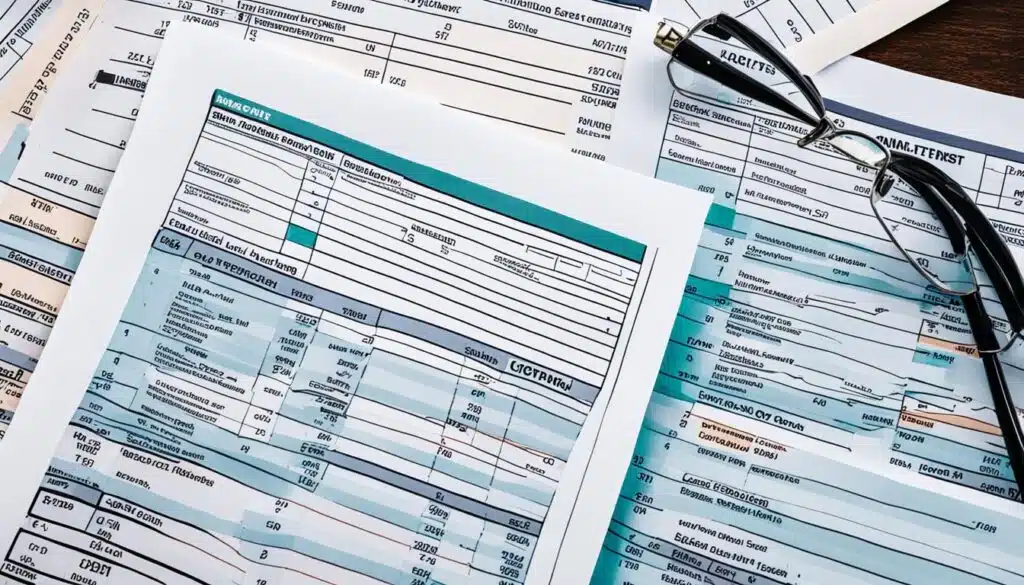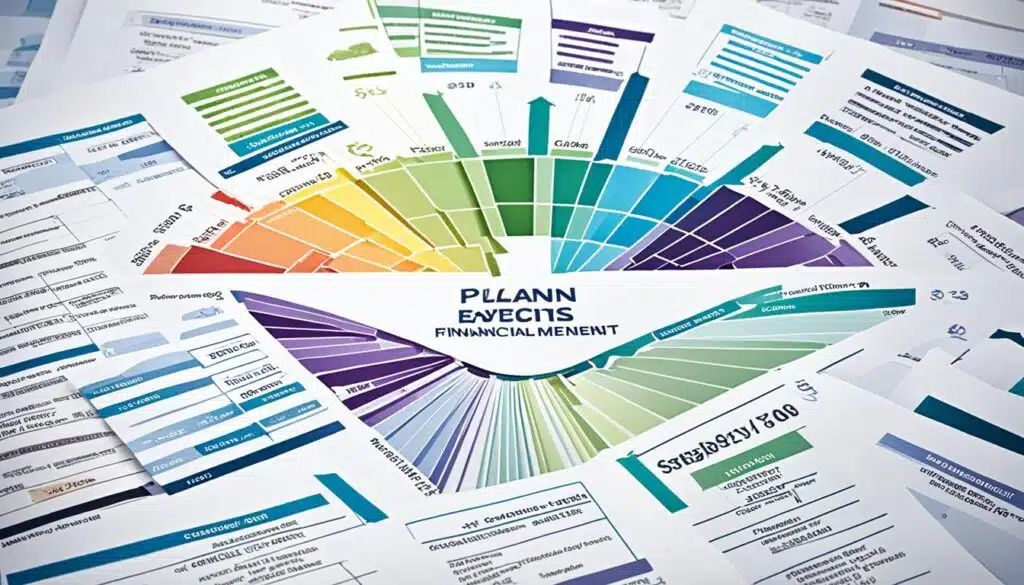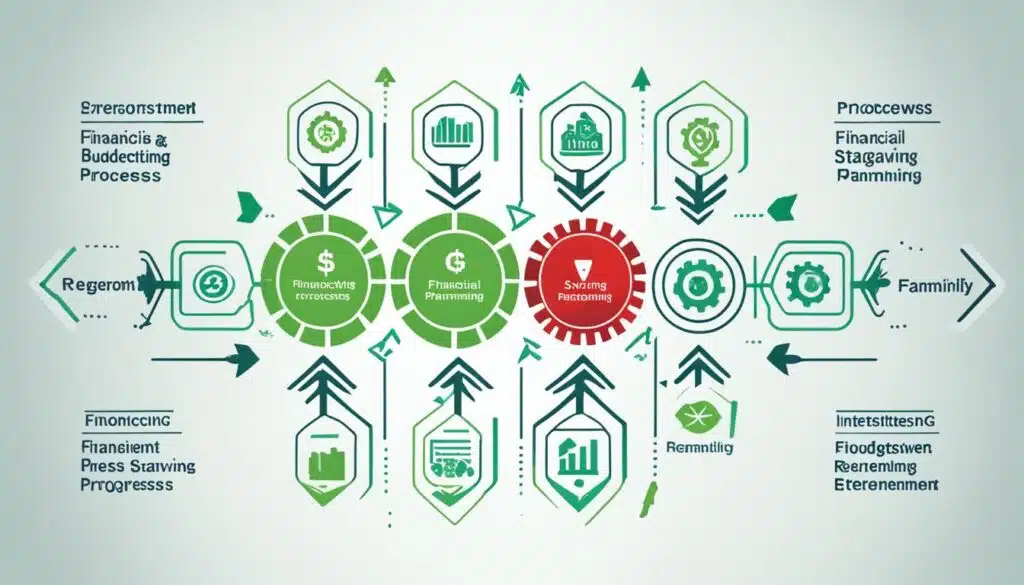Financial planning is key to taking charge of your financial future. It helps individuals and businesses set clear goals and understand their finances. By following a structured plan, you can make strategies that fit your needs and keep track of your progress. This guide will show you the main steps in financial planning, using expert advice and research to help you manage your money well.
Key Takeaways
- Financial planning is a structured approach to achieving long-term financial security and success.
- Establishing clear financial goals is the first step in the planning process.
- Gathering comprehensive financial information is crucial for assessing one’s current financial situation.
- Developing a customised financial plan helps to align strategies with personal or business objectives.
- Regularly monitoring progress and making necessary adjustments is essential for adapting to changing circumstances.
Understanding the Value of Financial Planning
Financial planning is key to unlocking long-term benefits for individuals and families. A 2017 study by the International Longevity Centre (ILC) and Royal London highlighted the importance of getting professional financial advice.
Findings from the ILC and Royal London Study
The study looked at Britons who got advice from a financial adviser from 2001 to 2006. The results were striking – those who got advice were nearly £50,000 better off after ten years than those who didn’t. The total value of advice was a huge 2,400% more than the initial cost.
Benefits of Seeking Professional Financial Advice
The study showed that financial planning helped most with lower incomes and those who got advice more than once. Getting a financial adviser offers many benefits, such as:
- Improved investment returns and wealth building
- Better risk management and financial security
- Achieving personal financial goals more effectively
Financial planning does more than just increase money; it also brings peace of mind, confidence, and a clear path to long-term success.
“Seeking professional financial guidance can provide significant long-term benefits, including improved investment returns, better risk management, and the achievement of financial goals.”
Also Read : Mastering Your Money: Essential Tips For Managing Finances
Establish Your Financial Goals

Before you start planning your finances, it’s key to set clear goals. These goals could be buying a home, paying off debt, saving for retirement, or planning a dream holiday. Having specific, measurable, achievable, relevant, and time-bound (SMART) goals makes your financial plan clear and focused.
Aligning your financial strategies with your goals helps you make a roadmap for success. This keeps you focused on what’s important to you. Whether you want to increase your wealth, manage debt, or plan for retirement, setting clear goals is the first step to a successful financial plan.
- Identify your short-term, medium-term, and long-term financial goals
- Ensure your goals are SMART (Specific, Measurable, Achievable, Relevant, Time-bound)
- Prioritise your goals based on their importance and timeline
- Regularly review and adjust your goals as your circumstances change
Spending time on setting your financial goals can greatly benefit you later. By knowing what you want to achieve, you can create a financial plan that supports your financial goal setting, helps you build wealth, and leads you to a secure financial future.
“A goal without a plan is just a wish.” – Antoine de Saint-Exupéry
| Type of Goal | Examples | Timeframe |
|---|---|---|
| Short-term | Pay off credit card debt, save for a holiday | 1-2 years |
| Medium-term | Build an emergency fund, purchase a home | 3-5 years |
| Long-term | Achieve a comfortable retirement planning, start a business | 5+ years |
By setting your financial goals, you can make a clear plan for your financial success. This could mean debt management, wealth building, or securing your financial future.
Also Read: The Ultimate Guide To Saving Money On A Tight Budget
Gather Comprehensive Financial Information

Starting with a clear view of your finances is key. You need to know your income, expenses, and what you owe. This info helps you make smart choices and plan your finances well.
Income Sources, Expenses, and Financial Commitments
First, list all your income, like from a job, investments, or other sources. Then, track your spending, separating it into must-haves and things you can skip. Remember to include regular payments, like loan repayments or insurance.
- Identify all income sources, including salaries, dividends, rental income, and any other earnings.
- Meticulously record your expenses, separating them into categories like housing, utilities, transportation, and leisure.
- Document any outstanding debts, regular bill payments, or other financial commitments you have.
Collecting this financial information gives you a full picture of your finances. You’ll see what you own, owe, and how money moves in and out. This is crucial for planning your finances well.
| Income Sources | Monthly Expenses | Financial Commitments |
|---|---|---|
| Salary | Rent/Mortgage | Loan Payments |
| Dividends | Utilities | Insurance Premiums |
| Rental Income | Groceries | Retirement Contributions |
| Interest Earned | Transportation | Childcare Expenses |
By carefully gathering financial information, you’re ready to make smart choices. You can create a detailed financial plan that meets your needs and goals.
Also Read : How To Manage Your Money: Essential Personal Finance Tips
Assess Your Current Financial Situation

To make a good financial plan, you need to look closely at your current money situation. This deep check will show you how your money moves, what you own and owe, how much risk you can take, and what you know about investing. These are key parts of making a financial plan that fits you.
Analyse Cash Flow, Assets, and Liabilities
Start by looking at your cash flow – the money coming in and going out. Look at where your money comes from, what you spend it on, and how much you save. This will show you where you can spend less and save more or pay off debts.
Then, check out your assets and debts. See how much your savings, investments, and property are worth. Compare them to your debts like loans and credit card bills. This will show your net worth, which is key to your financial health.
Evaluate Risk Tolerance and Investment Knowledge
Understanding how much risk you can handle and what you know about investing is vital. Think about how okay you are with your investments going up and down in value. Also, know about things like spreading your investments out and managing risks.
By really looking at your financial situation, you can spot areas to get better, see ways to grow, and build a strong base for your financial plan.
Also Read : 10 Essential Budgeting Tips For Financial Success
Financial Planning

Now that you know your goals and financial situation, it’s time to make a financial plan. This plan should have clear strategies and steps for each goal. It must consider budgeting, saving, investing, managing debt, insurance, and tax planning. By matching your plan with your priorities and timelines, you can make a roadmap for financial success that fits your needs.
Develop a Customised Financial Plan
Creating a custom financial plan is key to managing your finances well. It should fit your personal goals, resources, and how much risk you can take. This plan helps you make smart choices and stay focused on your financial goals.
Consider Budgeting, Saving, Investing, and Insurance
A good customised financial plan includes several parts:
- Budgeting: Making a budget to manage your money well. This ensures you spend within your means and save for your goals.
- Saving: Having a savings plan to build an emergency fund and save for both short and long-term goals.
- Investing: Creating an investment portfolio that matches your risk level, time frame, and goals. This helps grow your money and secure your future.
- Insurance: Looking at what insurance you need, like life, health, and property coverage. This protects you and your loved ones from sudden financial problems.
By thinking about these key areas, you can make a customised financial plan that suits your financial situation. This plan will help you move towards financial security over time.
Execute Your Financial Plan

Putting your financial plan into action is key to reaching your goals. It’s vital to stick to your plan and adjust your spending habits. This ensures your strategies work well.
Implement Strategies and Adjust Spending Habits
Begin by putting your financial plan into action. This could mean automating your savings, spreading out your investments, or paying off debt to cut interest. Keep to your plan, even when it gets tough or tempting to stray.
Watch your spending closely and be ready to change it if needed. Check your budget often and find ways to cut back on unnecessary costs. By spending more wisely, you can save more money for your goals, like paying off debt, saving, or investing.
- Implement the strategies outlined in your financial plan
- Automate your savings and diversify your investments
- Closely monitor your spending and adjust habits as needed
- Maintain a disciplined approach to achieve your financial objectives
Remember, sticking to your financial plan means being consistent and flexible. By staying focused and making changes when needed, you’re more likely to succeed with your financial goals.
“The key to successful financial planning is not just creating a plan, but consistently executing it and making necessary adjustments along the way.”
Also Read : What Are The Best Online Platforms For Learning Stock Market Courses?
Monitor Progress and Adapt

Financial planning is a continuous process. It needs regular financial plan monitoring and changes. You should often check your budget, investment portfolio, and plan to keep them in line with your goals.
Be ready to adjust your plan when your life or financial goals change. Regular checks and tweaks help you stay on track towards your goal tracking.
Review Budget, Investment Portfolio, and Goals
Set aside time to deeply review your budget. Look at your income, expenses, and how you spend money. This helps you find ways to save better and make budget review a key part of managing your money.
Keep an eye on your investment portfolio to make sure it’s spread out right and fits your risk level and goals. If you’re unsure, talk to a financial expert for help with investment portfolio management.
Check your financial goals often to make sure they’re still right for you. Be ready to change them if your life or priorities shift.
Make Necessary Adjustments
After reviewing your budget, portfolio, and goals, adjust your financial plan if needed. This could mean changing how you spend, rebalancing your investments, or updating your long-term goals.
Learning more about personal finance and getting advice from a financial adviser can also improve your plan. It makes sure it meets your changing needs and priorities.
“Regular financial plan monitoring and adaptation is the key to achieving long-term financial success.”
Revise and Refine Over Time

As life changes and your priorities shift, it’s vital to regularly check and update your financial plan. This ensures your plan matches your new goals, income, and risk profile. Being proactive in optimising your financial plan helps make it more effective.
Reflect Changes in Goals, Income, and Risk Profile
Your financial goals, income, and how much risk you can handle may change over time. It’s crucial to review your financial plan often to keep up with these changes. This might mean:
- Reassessing your short-term and long-term financial goals to make sure they match your current priorities
- Updating your income sources and spending to reflect your current financial state
- Checking your risk tolerance and investment knowledge to see if your portfolio needs changes
By continuously learning about personal finance and getting advice from a financial expert, you can improve your plan. This ensures it meets your changing needs and priorities.
“The only constant in life is change, and your financial plan should adapt accordingly.”
Updating and improving your financial plan is a continuous task. It’s key for making sure your strategies keep working for you as your life and situation change. By being alert and making the right adjustments, you can make your financial plan as effective as possible over the long term.
The Financial Planning Process

Financial planning is a structured way to help you reach your financial goals. It includes steps that guide you to a solid financial strategy. This method ensures your financial plan matches your strategic goals.
5 Steps of the Financial Planning Process
- Collect Financial Information – Gather all the details about your income, expenses, assets, liabilities, and financial duties.
- Analyse Financial Information – Look closely at your cash flow, how much risk you can take, your knowledge of investments, and your current financial state.
- Develop a Financial Plan – Make a plan that suits your needs in budgeting, saving, investing, and insurance.
- Select a Course of Action – Put the strategies from your financial plan into action and change your spending habits as needed.
- Monitor Progress and Adapt – Keep an eye on your budget, investments, and goals. Make changes if needed to keep your plan on track.
This five-step financial planning process gives you a clear way to meet your financial goals. By gathering data, analysing your situation, developing a tailored plan, implementing strategies, and monitoring progress, you can make a financial plan that fits your goals and changes as needed.
| Step | Description |
|---|---|
| 1. Collect Financial Information | Gather comprehensive data about your income sources, expenses, assets, liabilities and financial commitments. |
| 2. Analyse Financial Information | Carefully examine your cash flow, risk tolerance, investment knowledge and current financial situation. |
| 3. Develop a Financial Plan | Create a customised plan that addresses your budgeting, saving, investing and insurance needs. |
| 4. Select a Course of Action | Implement the strategies outlined in your financial plan and adjust your spending habits accordingly. |
| 5. Monitor Progress and Adapt | Regularly review your budget, investment portfolio and goals, making necessary adjustments to ensure your plan remains on track. |
By following this structured financial planning process, you can make a detailed and flexible financial strategy. This helps you reach your long-term financial goals.
Conclusion
Effective financial planning is crucial for long-term financial security and success. This article has shown you how to create a plan that fits your goals, resources, and risk level. Remember, financial planning is a continuous process that needs regular updates and adjustments.
Stay true to your goals and get expert advice when needed. This will help you build a strong base for a better financial future. Use the power of financial planning to manage your financial security and wealth building today.
Financial planning helps you make smart choices, handle risks, and reach your financial dreams. Start this journey to find financial stability and a bright future.
FAQs
What is the value of financial planning?
A 2017 study by the International Longevity Centre (ILC) and Royal London found financial advice could make someone nearly £48,000 better off over ten years. This is compared to not getting advice. The study showed advice’s value was about 2,400% more than the initial consultation cost.
What are the benefits of seeking professional financial advice?
Getting professional financial advice can lead to better investment returns and risk management. It helps you achieve your financial goals. These benefits are especially true for those with less money and those who get advice often.
How do I establish my financial goals?
Start by setting SMART goals. This means making them specific, measurable, achievable, relevant, and time-bound. This approach gives your financial plan direction and clarity. It helps you stay focused on what’s important to you.
What kind of financial information do I need to gather?
Gather all your financial info, like income, expenses, and what you own and owe. Include investment accounts, insurance, and any other financial commitments. Understanding your finances helps you plan better.
How do I assess my current financial situation?
Look at your income, spending, and savings to understand your cash flow. Check your assets and debts to see your net worth. Think about how much risk you can take and what financial responsibilities you have. This helps you see where you need to improve and plan better.
What should be included in my financial plan?
Your plan should have strategies for budgeting, saving, investing, managing debt, insurance, and tax planning. Make it fit your goals, timelines, and how much risk you can take. This way, your plan meets your unique needs.
How do I execute my financial plan?
Put your plan into action by automating savings, changing how you spend, diversifying investments, or refinancing debt. Stay committed, even when it’s hard. This will help you stick to your goals.
How do I monitor and adapt my financial plan?
Regularly check your budget and investments to keep them in line with your goals. Be ready to adjust if your life or financial goals change. Learning more about finance and getting advice from a professional can also improve your plan.
How do I revise and refine my financial plan over time?
Update your plan to reflect changes in your life and finances. Keep making your financial strategy better to improve its effectiveness. Learning more about finance and getting advice can also help you keep your plan relevant to your needs.
What are the key steps in the financial planning process?
The financial planning process has five main steps: 1) Collecting financial info, 2) analysing it, 3) making a financial plan, 4) choosing what to do, and 5) keeping track of progress. This structured approach ensures your plan is thorough, flexible, and matches your goals.









